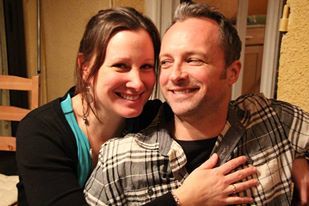
“The very substance of ambition is merely the shadow of a dream.” William Shakespeare
The question becomes, ‘What dream are we pursuing now?”
Scratch, scratch… itchy feet. Some of us are more ambitious than others, or you can say some of us are only content with a project in the fold, a dream in the works, a level to achieve. I would say we fall into this category, as when the moment we have nothing to reach for, Alfonz and I plummet into a melancholic void. We search for time fillers, hobbies to master and eventually we dream anew?

The idea was basic. Students vacation with their English teacher!
Alfonz and I have wanted to start a business in Europe that would take us between our homes in Capestang, France and our apartment in Budapest, Hungary. At first we came up with ‘Angol Otthon Itthon’ which translates to ‘English Home at Home’, a cute play on words. Through our company, and in our home, we offer an immersion homestay program connecting students wishing to learn English, to our family during school vacations.
We host 2-4 children at once and offer English lessons, activities and food each day. Sometimes we take them horseback riding, kayaking, canoeing, hiking, bowling… The students get to chose from a long list of local activities. This offers an opportunity for a break during the intensive week, but also provides new vocabulary. We watch movies, learn songs, play games, but the objective is to have the children doing their daily routines in English in our home.

Linguistic Sejour in France
Of course we are not the inventors of homestay immersion programs. They are throughout every country in the world. In fact we work for an agency in France called Daily English doing a similar program throughout the 20 weeks of French school holidays. Sally Cornan is the owner and she is a fabulous person to work for in France; always professional and always looking for ways to improve business. We have a symbiotic relationship which proves prosperous for everyone connected to her, and I am proud to be working with such a capable person. It is from her I get my inspiration. If working with students sounds like something you are interested in, please connect with Sally through the above link.
We are already so busy
We realize running a business in Hungary and another two businesses in France (Le Petit Platane and South Westy Tours) is a tall order to fill. Our lives are already so busy with two active children, learning French, adapting to the culture, volunteer work and having some kind of life that doesn’t revolve around work. However, Alfonz and I feel motivated by the idea of connecting more often with our family in Hungary. By combining work with summer vacation seems a natural solution.
As the booking agent for students in Hungary, our responsibilities increase; from making sure all the insurance and paperwork is in place, screening both new families wanting to join our team and pairing them with students of the correct age groups and their levels. We must make sure the lessons follow the curriculum and we train our families to follow our guidelines. And every family goes through a strict screening process and a house inspection before hiring.

Why a business in Hungary?
First and the obvious answer is because we speak Hungarian and although with younger students that does come in handy, it is actually not a necessity when teaching English as a second language. In fact, from my experience, not talking to the student in their first language stops them from using it as a crutch and they must utilize their already learned vocabulary.
Comparing Accents
But it gets interesting when you start to compare the accents of both French and Hungarian students, something Alfonz has noticed. What he has found here in France hosting students for years, is that the French kids have a very strong accent when speaking in English, however when they learn with our family with the typical ‘American’ accent, they have an easier time being understood. Of course we are not American at all, but for all purposes here in Europe, when comparing UK to American English; Canadian accents are far closer to American. The same principal applies to the Hungarian students learning to speak English.
In reality Canada has a few dozen different dialects in itself, plus add in all the different migrants and cultures who speak English in Canada, we are used to hearing many different accents and a mix of different vocabulary from around the world. It is a benefit when teaching English as a second language. In multi-cultural countries like the US and Canada you end up with a living evolving language which is changing from the effects of this amalgamation. New words are added all the time, and words that can’t translate are used in their original form. I like this concept, although the English teachers from the UK may disagree saying the evolving language diminishes the original language. I can’t tell you how many times I have had this conversation with retired English folks in France. However, my opinion still remains that language must change to keep up with our world.
The world feels like it is getting smaller and communicating with each other is not just an option anymore but a necessity to keep up with the times. Lucky for us that English is the #1 language used for business in the world.
Europeans have a tendency to call North, Central and South Americans; Americans.
Another point to make is that the USA is so big, some 320 million people strong, of course a Texan sounds completely different from a New Yorker. Yet all of us ‘American’ English speakers have something in common. We generally hit the endings of each word and we pronounce most of the syllables. Unlike French, where the last syllables are only for show or optional. And in direct contrast to Hungarian which is purely phonetic (logical if difficult) language with a total of 42 letters with no two sounding alike. Both French and Hungarian are among the hardest languages in the world to learn, and our family happens to speak all three.
Communicating with ESL students with other ESL students in the real world is now commonplace. Combating the accents seems like the biggest obstacle in both France and Hungary. Just get two ESL students, one from each country into the same room and I will show you two extremely frustrated people. Even using a high level of vocabulary, the accent makes it hard for them to understand one another. By softening both their accents, I believe it will eventually bridge the gap when they talk to other ESL learners. And probably eradicate a fear they have of each other. It’s true, Hungary may as well be on mars to a Frenchmen, and vice-a-versa. Which surprises me because the cultures to me are surprisingly similar.
My conclusion has been that American English is far easier to learn probably from the influence of American films and music, it seems the popular choice these days for ESL students. 89% of the world speaks English like me, and only 11% speak traditional British English.
Personally I love the English accent, and here in France my neighbour learned with a family in London and has a perfect accent. If I lived in the UK for a year I am sure to pick it up. My sister lives in Scotland and she has a good little accent from there too. Fashionable if not practical.
My point is that being aware of different accents while learning English may be the key to success in business throughout the world.

For Anglophone families whatever your accent, hosting can be a very rewarding and lucrative means of income throughout Europe. It is hard to find work in your host country without a good grasp of their language, yet this is a great option for new arrivals.
The school systems in both countries are frightfully the same.
Mostly downward learning with little wiggle room for children to think outside the box. Academics is the only importance. They mostly learn languages from books although in the private sector in both countries have far more divergent learning programs.
In English class, the teacher will address a grammar point, perhaps show them how to conjugate a verb and give the coinciding exercise for homework. They hardly have a chance to hear their new language in a conversation or to have an opportunity to speak their new language in class- especially with 30 other classmates. And sadly, many English teachers do not have a good grasp of the English language themselves. To counteract this, parents are finding ways outside of school for their children to learn English; from tutors to day care programs, to visiting the UK over the family breaks. And of course immersion programs like ours.
Parents recognize that crucial basics are being missed in the school system, and in Hungary, it is common place to learn with online tutors, like at Love Learning Languages where they offer lessons via Skype, or they hire local private tutors who come to the door.
Why Hungary now?
It feels like the right time to reconnect with our homeland. Hungary is an amazing place to visit, and becoming a top contender for tourism with a huge 30% increase in 2015 alone. It also made the top ten best places to live in the world, despite their low wages. If we can somehow help Hungary’s youth by giving them a chance to become fluent in English, it would feel like we are contributing something to the country. We would be helping our country become stronger in some small way. Then, perhaps eventually we can make the journey back to Budapest permanently.
I guess you can say we are taking the long way round.
Visit our new website for prices and schedules. If you would like to work on our team contact Eva at angolotthonitthon@gmail.com .
Angol Otthon Itthon is our newly launched homestay immersion program in Hungary ! Anglophones have the opportunity to help English students develop comprehensive skills that are just not taught in schools.











Hi Jon, where you from? Brilliant youtube link! I laughed, and ended up spending the morning watching Stephen Fry! I have touched on this topic before how moving to France my English is more subjected to criticism, than my Parisian French learned online. But Fry is right, it is exactly the critics that you must examine, because language is living, and changing with the people who are using it. Trying to stop it, to salvage the old ways, it to stop evolution. My critics often say, that’s not a word, or I don’t understand your meaning. But I have no problem understanding English spoken throughout the world, so really, who is missing out, me or them.
For me it would be like reading the Bible or just the classics and wondering why my children can’t understand me. And you know what, I’m the one that benefits the most from being up to date with the terms like Book, multiculturalism, or mealding. But I could dumb it down for them and only use a few hundred words from my vocabulary. Whichever… It is funny how slang from Britain like chin wag has no problem making its way to Canada, but new terms from America like ba-donga-dong are far slower to absorb in the other direction.
I love to mention that 11% of English speakers in the world use British English and the other 89% use a form of American English. Canada is a version in between; we spell like the Brits and use many terms for things from both but are still classified as ‘American’.
In Canada we read everything, are quite book sluts if you will, where many people of a certain generation would never read a book by an American author simply for lack of understanding. C’est la vie!
Hungary! yes us too! Private message me on your plans
“New words are added all the time, and words that can’t translate are used in their original form. I like this, although the English teachers from the UK may disagree saying the evolving language diminishes the original language.”
Interesting idea, but I don’t think you will find this conservative view to be any more prevalent in Great Britain than in North America. As you will know, unlike with some languages we native English speakers have no official governing body that dictates the rules, so our language has a wonderful life of it’s own. Here is one of the Anglo-sphere’s great wordsmiths, Stephen Fry, putting forward the liberal view about language, with the chat show host playing conservative a little. I like the ‘meld’ trick and the London/Paris-English/French analogy which seems to sum up the anglophone approach to language quite well. I might go as far to say this can be applied to other aspects of anglophone culture such as our common law preference vs francophone civil law – https://www.youtube.com/watch?v=wBOCHPCYnDw.
On a related note, ironically research suggests that modern UK English has diverged more from English spoken at the time of US independence than modern US English has! So actually, North American English is more ‘accurate’ in some sense.
I’m moving to Budapest in a month or so, so your blog is a great read. Thanks so much for sharing!
[…] and I already have a business in Hungary which we hope to expand; Angol Otthon Itthon our linguistic sejour business, […]